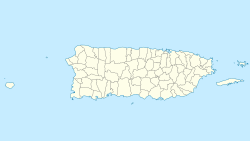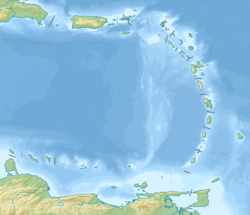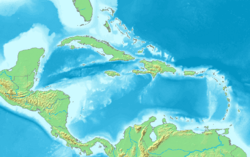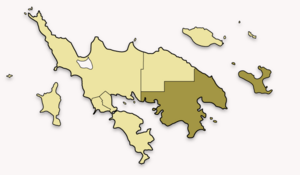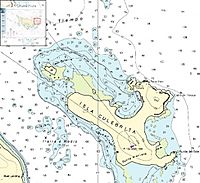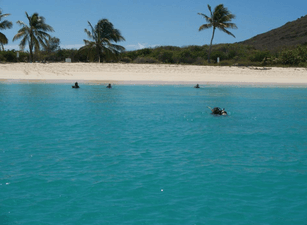Culebrita facts for kids
|
Nickname: Culebrita
|
|
|---|---|
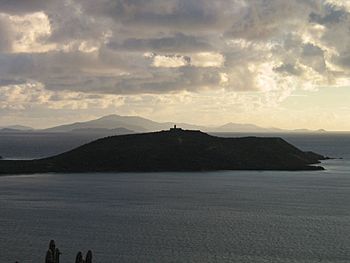
Culebrita lighthouse on top, Saint Thomas, U.S. Virgin Islands on the horizon
|
|
| Geography | |
| Location | Caribbean Sea |
| Coordinates | 18°18′49.3″N 65°13′38.8″W / 18.313694°N 65.227444°W |
| Archipelago | Puerto Rico Archipielago |
| Length | 1.7 km (1.06 mi) |
| Width | 1.5 km (0.93 mi) |
| Highest elevation | 185 m (607 ft) |
| Highest point | Lighthouse Hill |
| Administration | |
| Territory | Puerto Rico |
| Municipality | Culebra |
| Barrio | Fraile |
| Demographics | |
| Population | 0 (2020) |
| Additional information | |
| Nature Reserve (Culebra National Wildlife Refuge) | |
Isla Culebrita means "little Culebra" or "little snake." It is a small island that no one lives on. You can find it off the eastern coast of Culebra, Puerto Rico. This island is part of the larger Puerto Rico Archipielago.
Culebrita is a special nature reserve. It is also part of the Culebra National Wildlife Refuge. The island is home to the Culebrita Lighthouse, which is one of the oldest lighthouses in the Caribbean. You can only reach Culebrita by private boat from the main island of Culebra.
Contents
Exploring Isla Culebrita's Geography
Culebrita is a coral island. It is about 1 mile (1.7 km) long. The island looks a bit like the letter "Y" with three parts reaching out from its middle. The easternmost tip of Culebrita, called Punta del Este, is the farthest east land in all of Puerto Rico.
Beaches and Tidal Pools
Culebrita has six beautiful beaches. The most famous one is Playa Tortuga, or Turtle Beach. It is located on the north side of the island. This beach gets its name because many sea turtles come here to lay their eggs. They also feed in the waters nearby.
Another beach is called Trash Beach. It is on the side of the island where the wind blows a lot. Because of this, trash often washes up on its shores. West Beach is where water taxis from Culebra Island usually drop off visitors.
On the east side of Culebrita, you can find large tidal pools. These are like natural baths where people can relax. When the tide goes out, these pools trap small sea creatures. The west side of the island has two lagoons. The Culebrita Reef is located off the southern coast of the island.
Wildlife and Nature
Isla Culebrita is an important home for many animals and plants. It has two shallow lagoons. The biggest one is Laguna de Molino (Mill Lagoon). It is in the northwest part of the island. These lagoons are surrounded by small mangrove trees. These wet areas are very important for local wildlife.
Scientists have studied the plants and animals on Culebrita. They found 97 different kinds of plants. None of these plants are currently in danger of disappearing. They also saw 32 types of birds, 4 kinds of reptiles, and 2 types of mammals.
Some special animals live here. The brown pelican (Pelecanus occidentalis) is an endangered bird that has been seen on the island. The white-cheeked pintail (Anas bahamensis) is another bird that lives here. Endangered green sea turtles (Chelonia mydas) also visit the island. The endangered Culebra skink, a type of lizard, also makes Culebrita its home.
Gallery
Images for kids
See also
 In Spanish: Culebrita para niños
In Spanish: Culebrita para niños
 | Emma Amos |
 | Edward Mitchell Bannister |
 | Larry D. Alexander |
 | Ernie Barnes |


